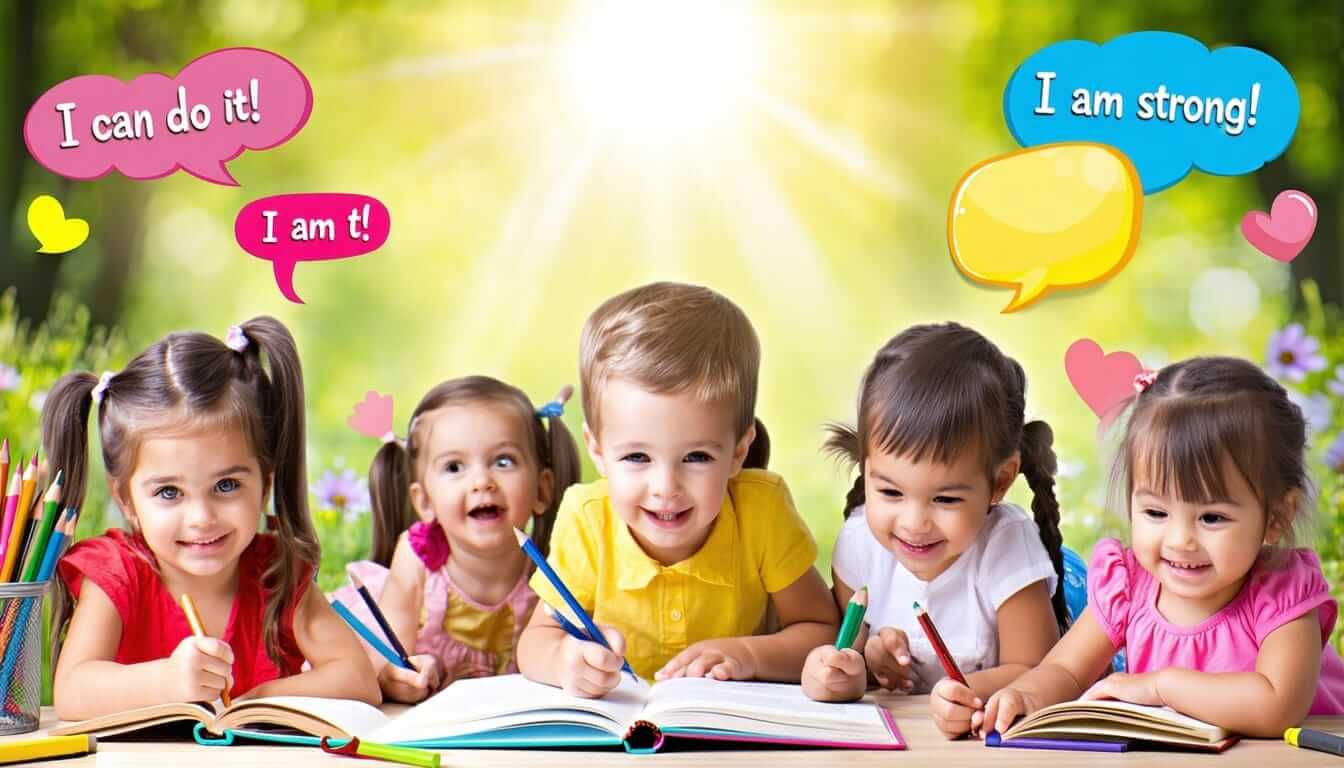Building Positive Self-Talk in Children
Understanding Negative Self-Talk
Negative self-talk is like a little gremlin whispering in a kid’s ear, just waiting to put a dent in their confidence. Past goof-ups, comparing themselves to buddies, or feeling squashed by outside forces can all bring this on. Now, your mission, should you choose to accept it, is to recognize what sets off these not-so-nice thoughts. Being aware takes work, sometimes a pro’s help is needed to stop those yucky ideas in their tracks.
Kids tend to think stuff like, “I can’t handle this,” “I’m just not cut out for this,” or “Nobody really cares about me.” When these kinds of thoughts stick around, they can create a never-ending loop. Your child might shy away from trying new things, miss out on fun experiences, and start believing they aren’t up for the task. Thus, it’s super important to nip these thoughts in the bud and foster some healthy self-love in your kiddo.
Impact of Negative Self-Talk
The bad side of negative self-talk isn’t just gloomy—it can make serious waves. When these thoughts linger, they can boost anxiety, bring moods down, and zap self-worth. Eventually, it screws up how they see themselves, potentially stirring up mental health challenges.
Take a look at this table highlighting how negative self-talk can impact your kid:
| Impact on Well-being | Description |
|---|---|
| Anxiety Skyrocket | Constant put-downs raise stress and jitters levels. |
| Deepened Blues | Never-ending critic thoughts can worsen mood swings. |
| Sagging Self-Esteem | Kids might start seeing themselves as not up to par. |
| Skewed Self-View | Recognizing what they’re good at gets lost in the shuffle. |
You’re the MVP in teaching tactics to help your kid smack down negative self-talk. Try slipping in some mindfulness, meditation, or CBT (Cognitive-behavioral therapy for the win!). These gems work by questioning those automatic downer thoughts and swapping them for a more balanced view. Creating a cozy, supportive atmosphere at home can make a world of difference, helping your child grow a positive mindset and roll with life’s ups and downs.
Check out more tips on teaching children positive thinking techniques and instilling positivity in child development.
Strategies for Promoting Positive Self-Talk
Want your child to see the sunny side more often? It all starts with taming that pesky negative self-talk. With the right tricks up your sleeve, you can help them swap out gloomy thoughts for brighter ones.
Catching Those Sneaky Negative Patterns
Start by getting your child to notice when they’re being their own worst critic. Ask them to tune into their thoughts, especially when stuff gets tough. Here’s how you can nudge them in the right direction:
- What’s running through your mind when stuff isn’t going your way?
- Does thinking like that make you feel any better?
A simple but powerful tactic is keeping a ‘thought tracker.’ Have your kid jot down the negative stuff when it pops up, so it’s not just rolling around in their head. This way, you both get to see what’s going on and tackle it together. Bring in a dash of mindfulness or cognitive-behavioral therapy (CBT) magic, which helps challenge those automatic negative thoughts and find a more chill way to see things (Mindful Health Solutions). Spotting these sneaky thought patterns is the first step to swapping them with cheerier viewpoints (ACAPS Texas).
Flipping the Script on Unkind Self-Talk
Once they’re onto these thoughts, it’s time to flip the script. Here are some ways your child can take the wheel:
-
Give Yourself a Break: Have your child think about how they’d treat a friend in the same boat. Little pep talks like “It’s cool to make mistakes” might just do the trick.
-
Challenge the Negative Stuff: Egg them on to question those thoughts. If they say, “I always mess up,” remind them of their wins. Getting them to see a bigger picture fosters balance.
-
Say the Nice Stuff: Introduce them to the magic of positive affirmations. Help craft daily mantras like “I am capable” or “Mistakes are just part of the journey.” Need inspiration? Check out positive thinking activities for children.
-
Mindful Moments: Practices like meditation can help your kid stop and think before reacting to their own inner critic (Mindful Health Solutions).
-
Lend an Ear: Encourage chats with you and other adults they trust. Talking things out and being reassured does wonders in reshaping their inner narrative.
With these approaches, you’re not just quieting their inner Eeyore, but boosting their self-esteem and mental mojo. For more ideas on painting your child’s world upbeat, dig into teaching children positive thinking techniques and instilling positivity in child development.
Importance of Positive Self-Talk in Children
Benefits of Positive Self-Talk
Giving your kids the gift of positive self-talk is like handing them a superpower. When you cheer them on with the “Yes I Can!” attitude, it helps them see their own potential and talents like you see them. Check out all the good stuff that comes with teaching your kids to chat positively with themselves:
| Benefit | What It Does |
|---|---|
| Chills Out Stress | Using positive words can keep kids’ stress and worries in check. |
| Boosts Confidence | A good inner pep talk ramps up how much kids believe in themselves. |
| Fires Up Motivation | Positive vibes motivate kids to chase their dreams full tilt. |
| Gets Stuff Done | Kids talking themselves up tend to get more things done, quicker. |
| Pumps Up Mental Health | Healthy self-talk is a win for mind and body alike. |
Living in a supportive bubble helps kids tackle obstacles tougher than a 500-piece puzzle. Need more ideas on how to boost positivity with your kids? Check out our positive thinking activities for kids.
Encouraging a Positive Mindset
Getting your kid to think on the sunny side is a game-changer. It doesn’t just perk them up emotionally—it also levels up their bounce-back game when life throws curveballs. Transferring their thoughts from gloomy to bright helps them cope like a pro.
Try these quick suggestions to keep it positive:
- Be the Role Model: Show them how you give yourself constructive kudos, inside and out.
- Push Positive Phrases: Let them script affirmations like “I can handle this,” turning cheer into habit.
- Zap That Negative Cloud: Walk them through pinning down and flipping their downer thoughts. Ask questions that make them rethink and reframe.
When kids learn to keep it positive, they don’t just vibe better with their pals, they excel in school too. For more on crafting a positive upbringing, dive into our guide on fostering a positive mindset in kids.
By raising little champs who talk themselves up and bounce back strong, you’re giving them all the right tools for the wild world out there. That’s a boost to self-esteem and a healthy mindset, and it’s setting the stage for better all-around life skills. Get more nuggets of wisdom in our pieces on importance of positive mindset in child growin’ up and building up a kid’s confidence through the power of positivity.
Teaching Positive Self-Talk Techniques
Want to pump up your kids’ confidence and mindset? Let’s chat about some real ways to get that positive self-talk rolling. Stick around to check out how you can model it, sprinkle in some cool affirmations, and smack down those pesky negative thoughts.
Modeling Positive Self-Talk
The best way for kids to learn positive chatter? Watch you do it, of course. They pick up what adults throw down, so set an example. When things get tough and you’d usually shrug and sigh, try flipping the script: Instead of moaning, say something like, “I’ve got this, and there’s something to learn here.” That “Bring It On!” attitude rubs off, and soon they’ll be singing the same tune.
In daily chit-chat, keep your vibe uplifting. Give yourself some credit for the effort, even when the results aren’t all sunshine and rainbows. Show them how slip-ups can teach you a thing or two. They’ll see that getting through tough stuff is part of life, armed with positivity and a bit of grit.
Positive Affirmations for Children
Affirmations are like little nuggets of positive vibes. They help kids swap out those not-so-nice thoughts with rockstar ones. Getting them to chant these mantras each day can flip how they see themselves. Here are a few to get started:
- “I’m capable and strong.”
- “I can learn anything with time and effort.”
- “I’m a great friend.”
- “I’ve got this!”
Make it fun—turn these affirmations into a poster, or better yet, jam out with them in a song. It’s more than just words; it’s giving them a fun and flashy reminder of their own awesomeness.
Challenging Negative Thoughts
Brushing off negative thoughts like pesky flies is a skill worth teaching early. Help kids catch those sneaky thoughts, like “I’m a failure” or “I just can’t.” Guide them with these questions:
- “Hey, is that really true though?”
- “Where’s the proof backing or busting this thought?”
- “How would I talk to a pal who felt this way?”
Show them how everyone takes a tumble now and then but gets up stronger. So instead of thinking “I bombed,” put it to them that “This didn’t go my way, but I’m gearing up for round two.”
Sprinkling in activities that focus on boosting positivity can really shore up their thinking. Little by little, they’ll learn to swap negatives for positives, crafting a mindset geared for resilience and kindness toward themselves. At the end of the day, it’s about fortifying their spirits with positivity so they can tackle life’s hurdles with a smile and can-do attitude.
Implementing Positive Self-Talk Practices
Getting your child to chat themselves up in a positive way is a big deal. It’s like giving their mind a friendly high-five, boosting how they handle life’s ups and downs and making them feel rock solid inside.
Making It Fun and Enjoyable
Turning positive self-talk into a fun adventure spices up the learning. Dive into games, storybooks, or art that sprinkle good vibes and pep talks all over the place. Here are some neat ways to kick things off:
| Activity | What to Do |
|---|---|
| Positive Affirmation Cards | Have them jazz up cards with cool statements like “I’m fearless” or “I can crack any puzzle.” Let them flip these cards often. |
| Gratitude Jar | Encourage them to jot down the little things that make them smile. Once weekly, open up the jar together, reminding them how blessed they are. |
| Storytelling | Spin tales featuring characters who conquer life’s glitches using a positive mindset. It’s like sneaky learning while having fun. |
| Role-Playing | Jump into scenarios together where positive self-talk saves the day, whether trying a new hobby or tackling a tricky problem. |
Mixing these activities into their daily shuffle can make thinking positively a natural part of life. Check out our positive thinking activities for children for extra inspiration.
Role of Parents and Educators
Parents and teachers, it’s your turn to step up and be positivity champions! Kids learn a lot from how you handle your world. Here’s how you can join this positivity movement:
- Show, Don’t Just Tell: Let your kids catch you talking yourself up. Slip a little kindness into how you tackle your hurdles. It shows that it’s cool to stumble, pick yourself up, and keep going (Parents Lead – North Dakota).
- Flip the Script: Guide them to spot those sneaky negative thoughts and turn them into power-packed positive ones. It’s like teaching resilience through a secret brain hack (Parents Lead – North Dakota).
- Throw Out Some Positive Vibes: Urge them to keep saying, “I got this” or “There’s next time for sure.” Teachers can sprinkle this positive mojo in the classroom, making it a safe space to learn and grow (Everyday Speech).
- Create a Cheerful Buzz: Set up a zone that’s all about boosting spirits with meaningful feedback and celebrating progress over perfection. It helps to nurture a mind that’s wired to grow (Mental Health Center Kids).
By teaming up, parents and educators can carve a path to a solid culture of boosting one’s own spirit in kids. This teamwork builds a strong base of resilience and emotional smarts that’ll serve them their whole life. Discover more about instilling positivity in child development to deepen this journey of nurturing a bright mindset.
The Power of Positive Self-Talk in Child Development
Nurturing Confidence and Resilience
Helping kids talk nice to themselves is like giving them a superpower for confidence and resilience. When they start chatting kindly in their heads, it’s like their own personal cheerleading squad, ready to tackle whatever comes their way with a “Yes I Can!” attitude. Experts have found that when kids think positively about themselves, they’re more pumped to push through tough spots and keep a sunny disposition (Mental Health Center for Kids).
One easy way to get this positive chatter going is by showing them, yourself. As a parent, when you talk positively, kids notice and start to copy you. Try some fun projects like arts and crafts or making a vision board that’s full of bright, encouraging words. It’s a crafty way to get those happy thoughts flowing (The Pathway 2 Success).
| Boosting Confidence Tricks | How They Help Kids |
|---|---|
| Saying Positive Things | Makes them feel good about themselves |
| Being Nice to Themselves | Helps them bounce back from tough times |
| Fun Creative Stuff | Keeps positive vibes rolling |
Impact on Social-Emotional Growth
Positive self-talk also does wonders for how kids feel and connect with pals. It’s like giving them a toolbox for handling feelings, making sense of them, and dealing with everyday ups and downs. When kids start talking about their emotions positively, it gets easier for them to say what they feel and what they need, improving friendships and interactions.
Adding a splash of positive self-talk during daily routines gives kids the chance to practice often. Fun role-play games where they pretend to stand up for themselves are awesome for boosting how they speak and bond with others. Encouraging them to flip bad thoughts into good ones is like building a stronger bridge to connect with others (Mental Health Center for Kids).
| Emotional Growth Fun | Benefits |
|---|---|
| Pretend Play | Builds chatting skills and confidence |
| Writing Happy Thoughts | Makes them think and feel deeply |
| Group Chats | Hones social skills and caring |
When you encourage a positive mindset, you do more than just boost your child’s confidence and resilience– you set the stage for their emotional and social journeys. Joining forces with them in boosting their self-talk leads to all-around benefits. Dig into more ideas with resources on teaching children positive thinking techniques and building resilience through a positive outlook.





0 Comments